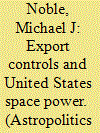|
|
|
Sort Order |
|
|
|
Items / Page
|
|
|
|
|
|
|
| Srl | Item |
| 1 |
ID:
176673


|
|
|
|
|
| Summary/Abstract |
Historically, the U.S. has sought to use commercial trade in nuclear technologies to influence international nuclear security standards and promote nonproliferation. Concern has grown that, with a stagnating domestic nuclear industry and declining export industry, the U.S. will lose a significant tool of foreign policy and leverage in maintaining strong international standards. While the issue has been discussed extensively in the policy community and used as a powerful rhetorical tool to motivate tangentially related policies such as subsidizing existing U.S. nuclear plants, no one has systematically assessed the issue, structured the problem and proposed and evaluated potential solutions. Here we briefly analyze the current international state of play, and then outline a set of specific strategies the U.S. might adopt on its own, or promote internationally, to retain its influence. Building on the literature, nuclear security and nuclear power experts assisted us in framing the issues and then, in a participatory workshop, helped us to assess and refine possible strategies. While not all experts agreed that U.S. influence has already declined, most indicated that it likely would decline in the future if present domestic and international trends continue. Although none of the proposed strategies that we advanced or that the experts suggested are likely to be effective in the short term, several warrant ongoing refinements and, if they can be implemented, might have beneficial impacts in coming decades.
|
|
|
|
|
|
|
|
|
|
|
|
|
|
|
|
| 2 |
ID:
085789


|
|
|
|
|
| Publication |
2008.
|
| Summary/Abstract |
This article assesses the impact of export policy on 21st century United States space power. The efficacy of current export controls in preventing the proliferation of space technologies and maintaining United States advantage is evaluated. The study finds that space launch technology has been and remains highly globalized; the United States has lost significant international communications satellite market share, but it maintains a tangible lead in position, navigation, and timing systems; and the recent growth in foreign imaging systems, both radar and optical, have eroded any advantage the United States once enjoyed. Furthermore, export controls have not appreciably slowed the internationalization of space and breaking dependency on the United States is a common underlying theme. The paper goes on to highlight the unintended consequences stemming from current policy, including limiting access to advanced technology of foreign origin, limiting access to foreign-born expertise, and adding "fog" and "friction" to the execution of programs that include foreign content. This paper finds current export control policy is incongruent with 21st century space power programs and initiatives, such as Operationally Responsive Space, Coalition Space, and "Soft" Space Power. Export control reform is suggested herein on the basis of developing a trusted community of trading partners.
|
|
|
|
|
|
|
|
|
|
|
|
|
|
|
|
| 3 |
ID:
153708


|
|
|
|
|
| Summary/Abstract |
Israel is currently one of the world’s leading exporters of defence goods and services. Its defence industries originated in the covert workshops of the Hagana and other resistance groups in the pre-independence era of the 1930s, supplying the pre-state armed forces with light weapons. Mainly relying on imported weapons, the French arms embargo in 1967 came as a shock to Israel’s leadership and public, causing a shift in policy towards self-sufficiency in major battlefield platforms (combat aircraft, armoured vehicles and warships) through indigenous research, development and fabrication. This policy of self-sufficiency was later modified to apply only to such weapons or systems that could not be obtained from abroad either for political or technical reasons. It can be expected that Israel defence industries now will focus more on sophisticated PGM’s and battlefield robotics, whilst the Government will strive to fully privatize the remaining state owned defence industries. How successful this will be remains to be seen.
|
|
|
|
|
|
|
|
|
|
|
|
|
|
|
|
|
|
|
|
|